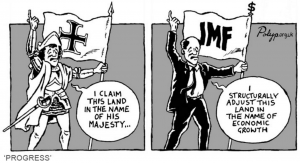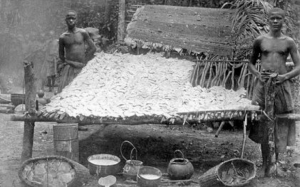“In contrast with the surging growth of the countries in the socialist camp…, the majority of the capitalist countries, is the unquestionable fact that a large proportion of the so-called underdeveloped countries are in total stagnation… These characteristics are not fortuitous; they correspond strictly to the nature of the capitalist system in full expansion, which transfers to the dependent countries the most abusive and barefaced forms of exploitation.”
– Che Guevara, 1964
Introduction to Development and Underdevelopment
While the notions of development and underdevelopment are is most commonly discussed in an economic context, the process of development ecompasses a broad range of factors, social, political, ethnicity, geography, etc, distinct to the environment in question. It should be understood that development is relative in nature, as countries in the Third World are only considered “underdeveloped” in comparison to the industrialized nations of world. More importantly, the concept of underdevelopment, especially as it pertains to the former colonies of imperialist nations, inherently implies a relationship of economic exploitation imposed from the imperialist nation onto lesser developed nations. Through these systems of economic exploitation, the consequences of underdevelopment are perpetuated, very often producing a host of corresponding societal ills that further impede efforts towards reform.
Historically, the rate and success of development development has been dependent on a multitude of factors– both internal and external. Internally, the capacity of the society to utilize their environment (i.e. geography, natural resources) is naturally based on the level of intellectual and technological advancement, in combination with the degree to which the labor is organized efficiently. The development of civilizations across the world developed at somewhat proportionate rates for millennia, but the course human development accelerated at an unprecedented rate through Europe’s transition to capitalism and the subsequent industrial revolution. Capitalism connoted a novel concept to modern society– an international competitive initiative to make the maximum profit out of production. This transition to mass scale production capabilities provided incentive to outsource human labor and natural resources at minimum cost from the colonial subjects. While capitalism brought unprecedented levels of development to Europe, the legacy of this exploitation has persisted since colonial independence in the form of prolonged economic dependence, internal political ethnic conflicts, and inadequate government programs and infrastructure.
Economic Dependency Theories:
In wake of the intensified attention paid to underdevelopment of of African nations after independence, there were fundamental disagreements over both the short and the long-term outcomes of the process in Africa, as well as identifying the deficiencies of the established theories of economic development (recently implemented successfully in the rebuilding of Europe). The preeminent school of thought concerning the topic was known as the “dependence theory.” This theory makes the contention that the attainment of independence, while ostensibly implying political sovereignty, actually conceals the underlying reality of continued dependence on the economic structures of its former colonizers. Despite their independence, the economic system emplaced makes the efforts towards to an autarchic economy and increased geopolitical influence virtually unattainable. Impatient with the stagnation of African states and increasing international socio-economic and developmental stratification with the industrial states, the dependency theory following attribute the source of the African postcolonial developmental problems not in their own incapacities, but rather in the constraints of international politics and economics.
Decolonization Theory:
In the debate surrounding much of Africa’s prolonged underdevelopment, an alternative school of thought came into light in the form of the decolonization theory. According to postcolonial thought, the relationships between the former European colonizers and African states are essentially still in the initial stages of a gradual evolutionary process away from colonial subjects to ideally being achieving political and economic autonomy. This philosophy implied a multi-step process, with political independence only representing the initial step of many in the following decades. The process would continue through the reforms of bilateral, imperialist favored policies and influence over the former colonial subjects with multilateral, reciprocally beneficial relationships. Granted, the progression of the layers of colonial influence removed would vary based on the the effectiveness and speed of government policies, the most common order of independence begins with government, continued by military, foreign population, economic reform, and cultural resurgence.
By this theory, the foundational roots of underdevelopment and economic dependence can be attributed to this process of decolonization. In this pattern, the movement of political independence eliminates the necessity and justification for the continued presence of imperialist military presence. In many cases, the departure of military presence leaves the expatriate population and foreign investment vulnerable, and the consequent reduction of foreign population leads to the the collapse of established industries and economic control. This explosive amalgamation of economic instability and political transition have too often produced a prolonged crisis of internal conflicts, destitute poverty, and widespread corruption.
“Colonial Capitalism” or Neo-Colonialism:
The tangential philosophy known as “Colonial Capitalism,” or Neo-Colonialism also developed in the Post-Colonial decades contains elements from both Dependence and Decolonization theories but is more deeply rooted in Africa’s. The focus of this theory surrounds the “prolonged crisis,” as seen in cases from as extreme the Biafran War in Nigeria, internal war crimes committed in Uganda, genocide in Rwanda, and continued instability and violence today the Congo and several other Central and West African nations. This concept draws into the African nation’s historical experience with capitalism. Unlike the development economic development from feudalism in Western Europe, the systems of capitalism in Africa were introduced under the context of European imperialism and colonialism. In this way, it was widely held that the Third World’s economic underdevelopment was inherent by structure— a term coined as “colonial capitalism.” This post-colonial theory contended that genuine economic independence could not be fully achieved, as their economies are structurally flawed by the forces of imperialism and colonialism.
Causes of Economic Dependency
When considering the causes of economic underdevelopment and dependency on the part of African countries, it is important to remember that this distinction is the explicit result of exploitation at the hands of colonizers. Colonizers used the idea of being at completely separate evolutionary points in development as justification for their intervention under the pretense that they would aid the African countries becoming more “civilized”. However, an investigation of the economic history of Africa before European contact reveals that there is a qualitative difference between the development of European and African economies that are expected given the different cultural motivations and environmental availabilities.
Pre- European Contact
According to anthropological evidence Africa is not only the origin of civilization, but of humanity as a whole. Thus, there is a long history of society in Africa prior to any direct economic contact with European countries in the 15th century. The basis of early African civilization was the family and kinship. A system of communalism was in place, which was set up on the basis of reciprocity, equal access to land, and equal distribution of goods within the kinship. The rights and roles of each individual were determined based on their placement within the familial lines of either the mother or the father. All land and labor was kept within the family which reinforced the subsistence economy that existed at the time and persisted. The primary economic activity was agriculture and the development of iron tools was particularly important in the generation of advanced tactic for dealing with their particular geographical specialties. Because of this focus landowners were particularly educated about the fine details of the terrain, down the specifics about the soil. This allowed for a diverse economy that provided for the community in a systematic and effective way. Though there was not as much development in terms of a scientific approach to agricultural production, the goals of sustenance made for little pressure to produce more crops than they needed.
Prior to the influx of European influence in the 15th century, there was evidence of a transitional stage from a communalist system to a feudal system. This transition was propelled by an increase in stratification and a rise of state. With economic specialization a caste like system emerged, providing certain rights and privileges given based on their role. For the most part there was a sense of mutual effort when it came to production, but there were still some clashes between groups such as pastoralists and cultivators. A barter system developed and with increasing quantity of trade a system of standards was formed to measure goods. Forms of money included salt, cloth, iron, hoes, and cowry shells. This set up a slight hierarchy in positioning which was the impetus for the development of the state. Though it these initial states were very weak and loosely held together by the remnants of communalism, it began the merging of ethnic groups into wider identifications.
Post- European Contact
The first significant interaction between Europe and Africa was in 1415 with voyages sponsored by Henry the Navigator of Portugal to establish trade for gold in West Africa. This introduction to foreign trade was the beginning of the movement of trade to the coast creating pockets of influence in these areas. At this time the Portuguese still viewed the Africans on a somewhat level playing field as “different but equal.” However, when other European countries began entering Africa, the Portuguese were pushed out and the relationship between shifted. When considering the foundation of economic dependency in Africa, the one crop economic system set up in many of the colonies for the express benefit of their European colonizers is the source of the problem. Nevertheless, the first one crop economy can be seen even before the official establishment of colonies and the direct control of African economy.
The slave trade, beginning in the mid to late 17th century, became so pervasive throughout Africa that it drove out almost all other commodities in African trade. Not only did it become the center of the economy, but it also depopulated the country while displacing others. The export of the African labor force was for the express purpose of profit on the part of the European countries. With the industrial revolution and slave revolts, there was no longer profit to be gained from the slave trade so in 1807 the slave trade was abolished in favor of legitimate commerce and a new economic role for Africa. “In fact, the new trade patterns, European exploration, missions, technological advances, and other outside factors are evidence of the intensification of European influence on the exploitation of the continent, and a preclude to colonialism.”
Effect on African Economy
After the detrimental European contact of the Slave trade, which robbed Africa of millions of people, the colonization period of the 19th and 20th centuries cemented a legacy of economic exploitation in Africa, which many countries are still reeling from today. “The aim of colonialism [was] to exploit the physical, human, and economic resources of an area to benefit the colonizing nation. European powers pursued this goal by encouraging the development of a commodity based trading system, a cash crop agriculture system, and by building a trade network linking the total economic output of a region to the demands of the colonizing state.” The linking of the total economic output of a region to its colonizing state often resulted in mono-crop economies. Countries like Egypt, Sudan, Mali, and the Congo were responsible for the production of raw goods such as: cotton, peanuts, coffee, and rubber. These were then transported to the European nations in charge of the respective countries. Due to the nature of the relationship between colonizer and colonized, these Western powers wanted to pay as little as possible for the goods that were being produced, essentially skewing individual countries economies to simply meet their population’s demands overseas. The ramifications of this for the African populations were that: food shortages and starvation became commonplace, and various other crops were not able to be in rotation, as mono-crop economies are extremely detrimental to the soil as nutrients are constantly being extracted, and never replenished.
The above image is a picture of two Congolese men standing next to drying rubber, the main export of the Congo, in the late 19th to to mid 20th century. An extremely cruel and exploitative system, “large numbers of men were worked to death, as Leopold’s ad hoc army raped and starved their wives to make them work harder to collect wild rubber…the harsh and appalling labor conditions under Leopold II reduced the population of the Congo by about 73 percent.” However, much like other nations, since the economy was structured around a mono-crop, rubber, once Belgium began to divest from the region, the nation’s economy suffered tremendously. Even today, the Congolese population still suffers from the exploitation of their natural resources by foreign entities. As recently as 2015, the case of a British oil company attempting to begin production in a protected national park was brought to the public light.
The 2014 documentary film, Virunga, tells the story of the rangers of Virunga national park in the Democratic Republic of Congo. These men not only risk their lives to protect the region from poachers and armed militant groups impeding on its territory, those representing Virunga were facing battle to preserve the park against the the proposal of oil production by the British corporation, SOCO. The film documents and reveals the process of corporate agents sent by the oil company to leverage the massive amount of corruption occurring within government and local authorities. This routine nature of exploitation to bypass any production obstacles and displace the local population represents a disturbingly analogous example to the actions of the European trade companies to first arrive in central Africa centuries before.
Nigeria, once a British colonial state, is a perfect example of how structures and systems erected during colonization, negatively affected the country upon its independence. A system had been erected in which income inequality was encouraged as the Igbo had all the natural resources and political power in respect to the other ethnic groups. In 1960 the “Federal Republic of Nigeria emerged as an independent nation from British colonial tutelage, however more than a century of British Imperialism had cemented the Nigerian economy under the control of Western firms.” When Nigerians rose to power, due to ethnic tensions created by the European establishment and a lack of leaders educated in the running of a country, corruption became commonplace, as politicians went to great lengths to maintain their own individual power. “Violence became synonymous with the struggle for political power all over Nigeria, as the conflict that arose in the Western Region escalated to include murder, fist fights in the parliament and election rigging.” For a country to function well, and have the majority of its citizens prosper, those in positions of leadership need to have the ability to put the greater good over private concerns. However in Nigeria, due to the precedent set by British colonial rule, “the effects of corruption, neglect of economic development and politicisation of ethnicity and religion serve to incapacitate the Nigerian bureaucracy and destroy the country’s social fabric.” “Projects that were supposed to launch Nigeria into industrialisation likewise became an avenue for self-enrichment thereby increasing underdevelopment and existential hardships for the populous. For example, Nigeria has spent billions of dollars on the establishment of steel mills which do not function. The same goes for oil refineries.” Until this is rectified, the current social divisions will continue to exist and schisms created by a legacy of colonization will continue to grow.
One of the rare examples of an economic African success story post colonization is Botswana. Botswana is home to, “one of the highest average per capita growth rates in the world since obtaining its independence from Great Britain in 1966.” However when looking at Botswana pre colonization, they “possessed pre-colonial tribal institutions that encouraged broad-based participation and placed constraints on political elites.” Even when colonization occurred, the British system did not affect these institutions due to the “peripheral nature of Botswana to the British Empire.” The most important factor in Botswana’s economic prosperity though, is the fact that diamonds are the main resource found within the country. This coupled with their democracy has been a recipe for Botswana’s success. Botswana’s policies in handling its enormous wealth of resources is truly the antithesis of the common pitfalls of the “resource curse.” As the political system is still rooted in the same pre-colonial traditional principles promoting broad participation, it was decided for political leaders to reduce their individual powers following decolonization. In turn, the tribal leaders in control of the mines agreed to turn the diamond mining rights over to national control. In contrast to historical precedence, This transition was made and has been maintained without the fear of massive corruption and internecine conflicts that have plagued so many African countries.


